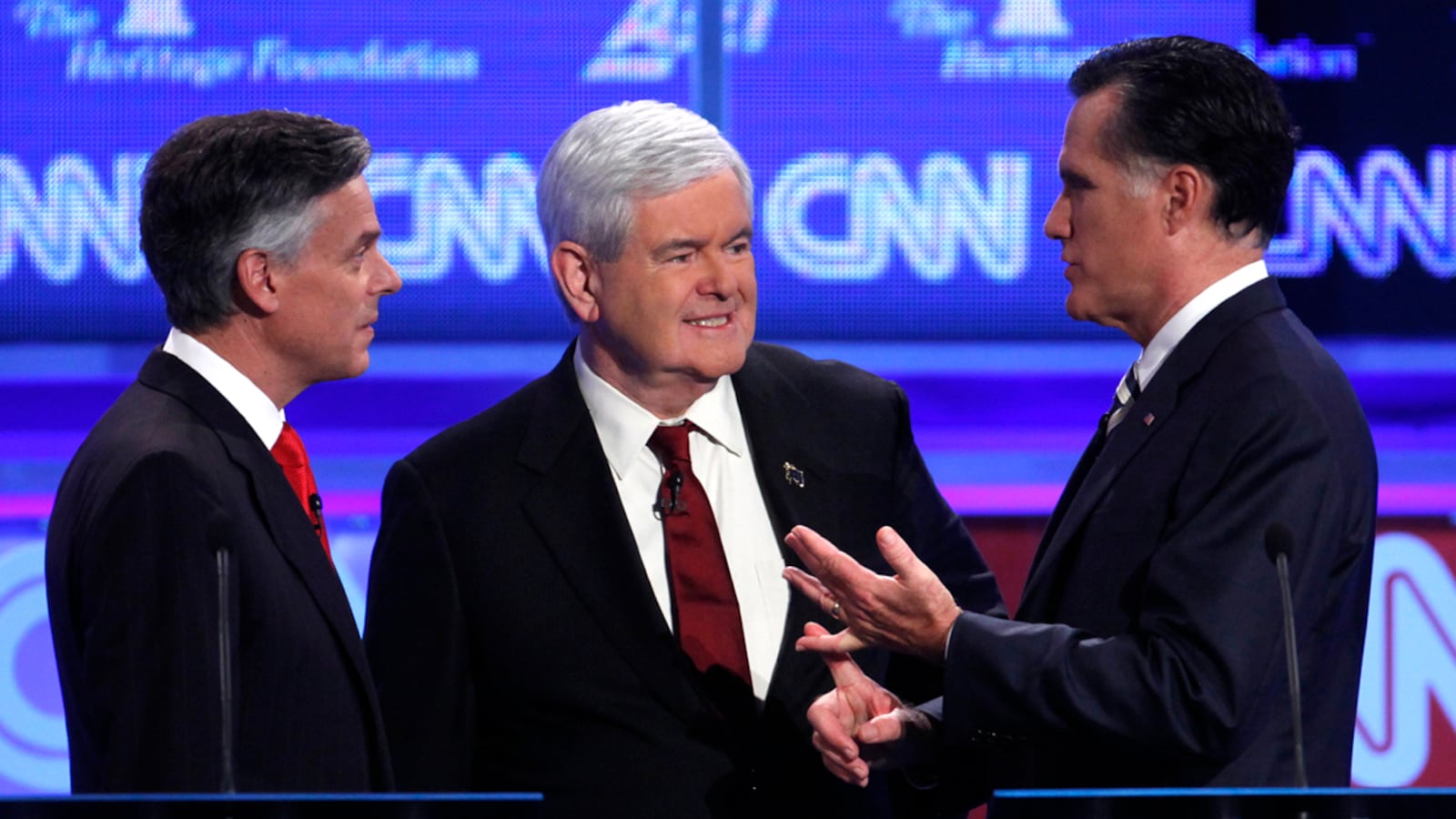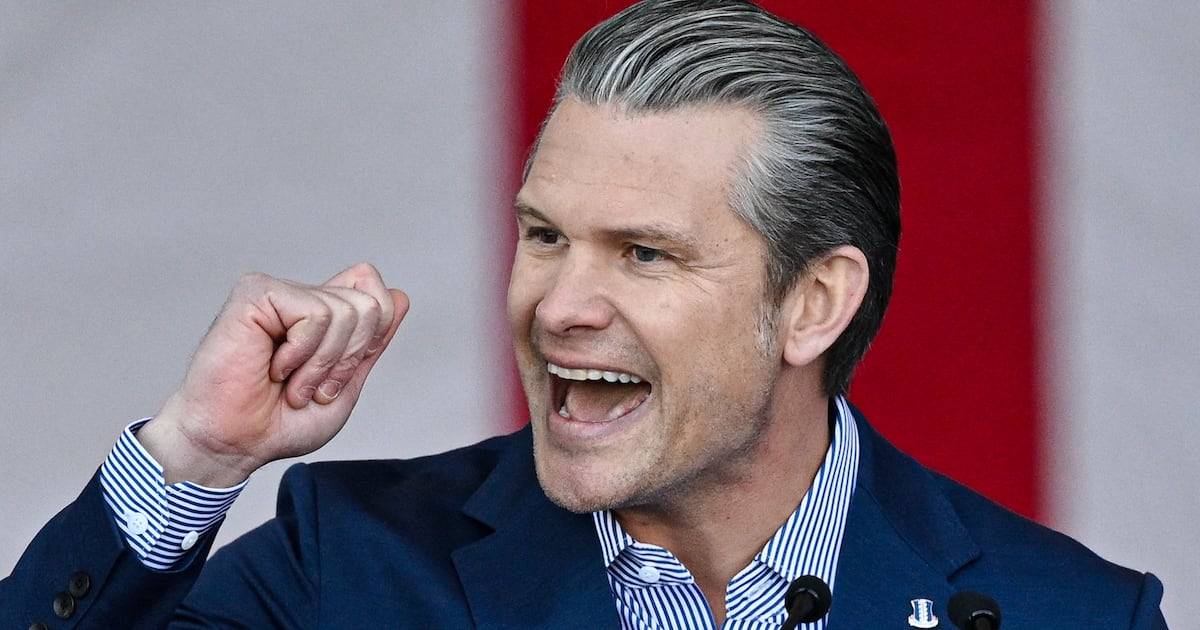Americans can learn more about foreign policy from The Real Housewives of New Jersey than from Republican presidential hopefuls. At least the shrieks of the housewives speak to reality. The Republican wolves howl about a mostly bygone world of dire military threats, a world inhabited by global ghosts to be thwarted by waterboarding and wars. Most of them just don’t see that the old right-wing rhetorical bromides that once scared Americans and dominated campaigning won’t win future elections.
Today, most Americans are fed up with unending wars in uncertain places without vital purpose. Most rightly demand to hear how international affairs will affect their economy and their jobs. But today’s Republicans—with the exception of Jon Huntsman and Ron Paul—still preach fire and brimstone to a congregation that’s barely listening to the Bush-Cheney and Cold War anthems. Even many, if not most, Republican voters, including many Tea Partiers, have had it with calls to increase military spending, keep U.S. troops in Iraq and Afghanistan, and start a new war with Iran—just like most other Americans. To be sure, promises to hang China from the nearest lamppost bring cheers from most voters, but at least this hysteria relates to the reality of trade and jobs.
Typical and telling is a recent CBS News Poll that found majorities of voters from all parties approve of removing U.S. troops from Iraq by the end of 2011. Regarding Afghanistan, 47% of Republicans chose decreasing troop levels; only 10% favored an increase, while 36% advocated maintaining present levels. Independents scored even more likely to support decreasing troops there. When asked "How great a threat is Iran?" only 22% of Republicans responded that that situation requires military action now. Notably, 52% of Republicans said Iran can be contained with diplomacy and 17% said it is not a threat at this time.

As for military expenditures, various polls show about half of Americans favoring cuts, with sentiment pretty evenly divided between the parties. Most Americans, however, are cautious about deep slices. This issue is also tied to jobs, which helps to explain the public’s caution. Wisely and by wide margins, the public shies away from more large-scale land wars like Iraq and Afghanistan. Indeed, viewers of the CNN debate last week at the cavernous Constitution Hall could not help but notice the bare smattering of applause for bombastic fist-shaking, though the audience was packed with party faithful. Sure, they cheered when the candidates branded the Democrats as wimps, but that was as far as they would go.
The real shocker was how all those candidates, save for Paul and Huntsman, almost totally neglected the now-central economic dimension of international affairs. Only those two noted the new reality of world politics—that economic strength now matters more than military might. Sure, America needs to maintain military superiority for lots of reasons, including its leadership role. But day in and day out, economics—trade, investment, innovation, jobs—is what really counts. Only Huntsman named our economy as the biggest national security issue.
Since John F. Kennedy, the GOP has ruled the foreign policy roost at election time and beyond. The Republicans monopolized the public trust on dealing with bad guys. The public felt they were tougher than the Democrats and better able to protect the nation. Now, the country could start feeling that Democrats could better protect their economic security than Republicans. Now, the decades-long era of Republican domination of America’s foreign policy debate may be slipping away.
The stale national security language of Republican candidates follows nicely the teachings of their advisers. They’re almost all from the traditional political-military camp with little background in economics. Most also are George W. Bush/Dick Cheney/Don Rumsfeld retreads, with a dash of Reaganites and a sprinkling of realists thrown in. Very few follow the paths of America’s best realists, who also happen to be Republicans—such as George H.W. Bush, Henry Kissinger, Brent Scowcroft, and James Baker.
Romney has a near-monopoly of established conservative advisers. His roster includes two of the top neoconservative intellectuals—Eliot Cohen and Robert Kagan; a Cheney anti-proliferation hand named Robert Joseph; two solid realists, Dov Zakheim and Vin Weber; and John Lehman, Reagan’s Navy secretary and Mitt’s guru on military spending. He also has pros like Michael Hayden, a retired general and intelligence expert. It’s a mix of good heads and screamers. But in Romney’s public remarks, the screamers seem to have the last word.
Newt Gingrich’s clan resembles, not surprisingly, Newt Gingrich—a collection of smart oddballs. Some notables are Robert “Bud” McFarlane, Reagan’s NSC adviser; Jim Woolsey, a creative and hawkish former Democrat and former CIA director; and the obscure Herman Pirchner, founding president of the American Foreign Policy Council, slated to be director of the advisory group.
Michele Bachmann seems happy just with Dr. Peter E. Waldron, whose position is described as “Faith Leader.” Herman Cain relies on a former naval officer. Ron Paul, a long-time member of the House Foreign Affairs Committee, mainly advises himself, as do Gingrich and Huntsman. Rick Perry is rumored to rely on Howdy Doody. Only Huntsman has had hands-on experience with the world and its problems. He served as ambassador to China and Singapore and as a senior trade negotiator.
Thus, it is easy to explain the candidates being out of touch with reality: it’s an explosive mix of unschooled (to be charitable) would-be leaders and mostly old-school, bomb-throwing advisers. The candidates’ rhetoric is highly unlikely to change during the primaries. It’s all they know, all their advisers whisper in their ears, and mistakenly, it’s what they think fellow Republicans want to hear.
Maybe once the standard bearer is selected next summer and the presidential campaign begins in earnest, the chosen one will find new advisers and start singing more about international economics, songs about how America’s economic muscle sits at the heart of 21st-century international power.
Such an adjustment is possible for Romney and Gingrich, the likelies, who are tried and true opportunists. They might see that war talk is bad politics even if they fail to grasp new global economic realities. One way or another and in due course, traditional Republican hawks will find that reality is passing them by.






